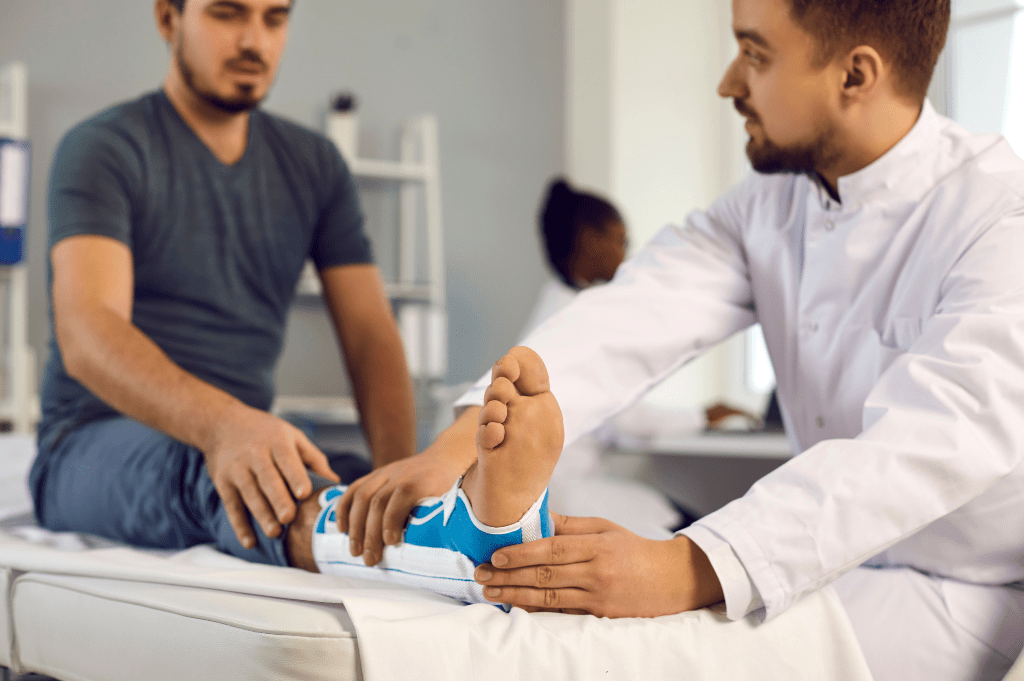
What Is an Orthopedic Surgeon and What Do They Do?
Learn more about this desirable medical specialty and how aspiring practitioners impact the field of medicine.
Persistent joint pain, a sports injury or mobility issues are some common signs to see an orthopedic specialist. But what is an orthopedic surgeon, and how do they differ from other medical professionals? Additionally, what is their role in diagnosing, treating and helping patients recover from the many conditions for which they provide care?
In this guide, we’ll dive into the essential information about orthopedic surgeons and their vital role in healthcare.
What Is an Orthopedic Surgeon?
An orthopedic surgeon specializes in diagnosing and treating bones, joints, tendons, ligaments, muscles and nerves that together provide structure, support and movement to the human body. Many orthopedic surgeons focus on certain areas of the body (for example the spine) or different procedures, and some also have specialized experience with certain diseases.
They undergo intensive training that is specifically focused on musculoskeletal conditions, and develop both surgical and non-surgical expertise, meaning they can provide extensively tailored care, ranging from conservative treatments like physical therapy and medication, to complex surgical procedures.
What Does an Orthopedic Surgeon Do?
So, what does an orthopedic surgeon do on a day-to-day basis?
They diagnose and treat a wide range of musculoskeletal injuries and diseases. Apart from being surgeons, they also provide non-surgical treatments and have an active part in prevention and rehabilitation.
Not all orthopedic surgeons are the same, but their primary responsibilities often include:
- Conducting patient evaluations, such as physical examinations.
- Reviewing medical history and ordering diagnostic tests like X-rays, MRIs or CT scans.
- Recommending treatment plans like surgery or physiotherapy.
- Performing surgical procedures like joint replacements or fracture repair.
- Managing post-surgical rehabilitation and follow-up care.
- Collaborating with physiotherapists and other specialists for full recovery.
Beyond treatment, orthopedic surgeons play an important role in injury prevention, particularly in sports medicine, where they work with athletes to prevent injuries and optimize performance.
Importantly, orthopedic surgeons treat patients across all age groups and activity levels.
Orthopedic Subspecialties: Areas of Expertise
The field of orthopedics includes numerous subspecialties, each focusing on specific areas of the musculoskeletal system. Here are some common orthopedic subspecialties:
- Foot and Ankle Surgeon
- Hand and Wrist Surgeon
- Joint Replacement Surgeon
- Orthopedic Spine Surgeon
- Pediatric Orthopedics
- Sports Medicine Specialist
- Trauma Surgeon
Apart from such specialty areas, there are also general orthopedic surgeons who treat a broad range of conditions related to bones, joints, tendons, ligaments and muscles.



What Does an Orthopedic Surgeon Treat?
The treatment will always depend on the injury, as there is an extensive range of conditions that affect the musculoskeletal system. Orthopedic surgeons will discuss the available surgical options, advising patients on the pros and cons, taking into account age, health and level of activity. They will also advise patients on non-surgical treatment options, their benefits and the risks, and the potential consequences of not going ahead with treatment.
Common treatments may include:
- Fixing fractures and broken bones
- Herniated discs and spinal deformities
- Joint replacements
- Keyhole surgery
- Repairs or reconstruction of tendons or ligaments
This comprehensive approach ensures patients receive appropriate treatment regardless of whether the condition requires surgical or non-surgical intervention.
Orthopedic Surgeon Education and Training
If you’re thinking about becoming an orthopedic surgeon, be prepared for an extensive educational and training journey. The typical pathway includes:
1. Earn a bachelor’s degree (4 years)
Firstly, consider earning a science-based or pre-medical bachelor’s degree from an accredited university and focus on subjects like biology, chemistry, physics, math and English.
2. Pass the Medical College Admissions Test (MCAT)
This examination will demonstrate your suitability for medical school. The MCAT is scored on a scale of 472 to 528, with each of its four sections receiving a scaled score. At St. Matthew’s University School of Medicine (SMUSOM), MCAT scores are only required from U.S. applicants.
3. Medical School (4 years)
Attend medical school and earn a Doctor of Medicine (MD) degree. At SMUSOM, successful MD program participants experience five semesters of classroom and lab-based learning on our Grand Cayman campus, followed by five semesters of clinical rotations at affiliated teaching hospitals, clinics and medical centers in the U.S., and select elective rotation sites in Canada.
4. Orthopedic Surgeon Residency (5 years)
After medical school, aspiring orthopedic surgeons generally complete a five-year residency training program. Resident physicians will spend the first two or more years in general surgery and then advance into orthopedics. Residents work under the supervision of experienced orthopedic surgeons and gradually take on increasing responsibility.
5. Fellowship (1-2 years)
Many orthopedic surgeons complete fellowship training in one of the subspecialties, which involves an in-depth study of a specific area, like sports medicine or joint replacement.
6. Licensing and Certification
Following residency and/or fellowship training, orthopedic surgeons must complete the licensing and certification requirements needed to practice in their desired location. This will vary by jurisdiction.
Altogether, it can take approximately 13-15 years of education and training to become a fully qualified orthopedic surgeon.
How Much Do Orthopedic Surgeons Make?
Orthopedic surgeons are among the highest-paid medical professionals, reflecting the high level of complexity and skill required in their field.
In the United States, the average annual salary for orthopedic surgeons ranges from $400,000 to $700,000 USD, with totals depending on location, employer, years of experience, type of practice (public vs. private), and subspecialty.
In other countries, salaries may vary, but generally, this career path offers competitive compensation reflecting the high level of skills, training and responsibility required to practice effectively.
What’s the Difference Between an Orthopedist and an Orthopedic Surgeon?
The terms orthopedic surgeon vs orthopedist are used interchangeably, but they do have slight differences. However, both are medical doctors who have completed the same extensive training in orthopedic surgery.
Orthopedist: Refers to any physician who specializes in musculoskeletal conditions. They may or may not perform surgery. Their main area of expertise lies in minor fractures, back pains, sprains and arthritis. They typically use treatments such as medication and physical therapy.
Orthopedic surgeon: They are doctors who are trained and licensed to perform surgical methods for their treatments.
In all, it’s more important to focus on the subspecialty training, experience and treatment options when considering a practitioner, rather than the title they use.
When Should You See an Orthopedic Surgeon?
Consider making an appointment to see an orthopedic doctor if you’re suffering from persistent pain in your:
- Bones
- Joints
- Ligaments
- Muscles
- Tendons
Your primary care physician may refer you to an orthopedic surgeon, but you can also seek consultation directly for many conditions. Early detection leads to better outcomes and often lets patients avoid the need for more invasive treatment later on.
Conclusion
If a career as an orthopedic surgeon sounds appealing, St. Matthew’s University School of Medicine can help you get there!
Our 10-semester MD program is designed to provide aspiring physicians with the early hands-on training, individualized support from dedicated faculty, clinical rotations in the U.S. (core and electives) and Canada (select electives), and extensive Student Services they need to achieve their practice goals.
Find out more about the learning experience at SMUSOM by viewing this student testimonial video:
Then contact us if you have any questions or start your own journey by applying today!
FAQs About Orthopedic Surgeons
Both specialties can treat spinal conditions, but their approach is different:
- Orthopedic surgeons focus on the structural aspects of the spine, including bones, joints, ligaments and related soft tissues.
- Neurosurgeons specialize in the nervous system, including the brain, spinal cord and nerves.
For the most common back problems, like herniated discs or spinal stenosis, either specialist can provide excellent care. The choice often depends on the specific condition, with complex neurological issues typically handled by neurosurgeons and structural spine problems by orthopedic spine surgeons.
Yes, orthopedic surgeons commonly treat arthritis, particularly when it affects the joints and bones. They can recommend treatments ranging from injections to joint replacement surgery.
However, for certain types of arthritis, particularly autoimmune forms like rheumatoid arthritis, you might also work with a rheumatologist who specializes in inflammatory conditions.
Orthopedic surgeons are not limited to just hospitals, as it also depends on their subspecialties. Many typically work in:
- Hospitals
- Private practices
- Specialty surgical centers
- Academic medical centers
- Rehabilitation centers
- Sport teams or the military
The diversity of practice settings allows orthopedic surgeons to provide care in environments that best serve their patients’ needs.
A rheumatologist specializes in autoimmune and inflammatory conditions affecting joints, muscles and soft tissues. They focus on medical management using medications and other non-surgical treatments.
An orthopedic surgeon treats structural problems with bones, joints and related tissues, offering both surgical and non-surgical solutions.
For inflammatory conditions like rheumatoid arthritis, a rheumatologist is typically the primary specialist. For mechanical problems, injuries or when surgery might be needed, an orthopedic surgeon is usually the better choice. Your primary care physician can help guide you based on your symptoms.